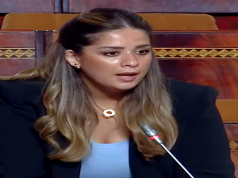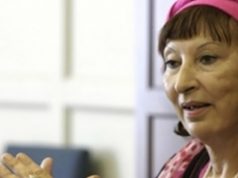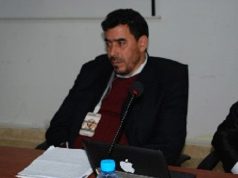[symple_box] Mr. Abdennabi Benchehda has worked as a MENA analyst with a number of institutions in the United States, Europe, and the Middle East for over twenty years. He holds a Master of Arts in International Relations. [/symple_box]
Mr. Abdennabi Benchehda has worked as a MENA analyst with a number of institutions in the United States, Europe, and the Middle East for over twenty years. He holds a Master of Arts in International Relations. [/symple_box]
The government’s action is a clear violation of article 6 of the Moroccan constitution and article 220 of the penal code; I doubt it will serve to improve the country’s image abroad; No so much because restricting Muslims’ freedom to worship in a country that proclaims Islam as its official religion goes counter to globally recognized human rights standards and should attract international censure, but because this Kemalist action does not meet the threshold of violations of individual freedoms that would cause the international media and NGOs to scream bloody murder. Local secular activists who vehemently protested the trial of two Moroccan women charged with indecency for being scantily dressed in public during fasting time in Ramadan do not assess the closure of fourteen mosques and barring worshipers from freely exercising their religion as contentious. In fact, this is considered a welcome security measure to reduce what Moroccan seculars and the West label the “Islamization” of society; they consider mosques breeding grounds for terrorism and pious observance of Islam as a sure indicator of zealotry. The cover page of the latest issue of Maroc Hebdo, for instance, shows a photo of Hassan II Mosque during tarawih, with a bold title that reads: “THE RISE OF RADICAL ISLAM: The Islamic fervor that has gripped the Moroccan society is worrying.”
This islamophobia is generated by self-proclaimed Muslims in a country whose King is the Emir of al-Moumenin and where more than 99% of the population is allegedly Muslim. It should be noted that the strength of Islamic fervor in Morocco has never diminished since Uqba ibn Nafi’ in 680. During the reign of Hassan II, Moroccans were just as fervent about Islam and flocked to mosques just as much as they do now. Then, they were not described as radicals; they were just Muslims. What has changed is the international security landscape and the aberrant emergence of a political secular movement that aims to introduce a socio-economic system that is antithetical to the existing Islamic system. Seculars argue that Islam is a repressive religion that needs to be reconciled with modernity. By modernity, they mean a superior paradigm based on moral universalism, liberal market practices, and a democratic political system. This, they assert, will elevate Morocco to the level of Western nations and will ultimately result is prosperity, justice, etc…. The majority of Moroccans, especially the youths, susceptible to the globalization propaganda machine, understand modernity in a purely esthetic and consumeristic way; it is the trendy hairstyle, the fashionable dress code, the latest gadgets, the best model cars and home appliances.
The problem the Moroccan secular movement has is that the core values framing the ideas they preach are rooted in a Judeo-Christian theopolitical influence that has been foundational to Western democracies. Without these Judeo-Christian core values, the secular culture of Western democracies would not have survived. It is not that Christianity has been alienated from politics as many wrongly believe; it is that Christianity is ‘already inscribed in the prediscursive dispositions and cultural instincts of the [Western] civilization,” as William E. Connolly argues in his seminal work “Why I Am Not a Secularist.” It is this “prediscursive dispositions” and “cultural instincts” that the secularists want to see implemented in Morocco well aware that it can only be achieved at the expense of Islam. In European and American political discourse, the latter has always been seen as an obstacle to Western hegemony. War and colonization being unpopular and prohibitively expensive today, the West projects its power and expands its sphere of influence through socio-economic-political instruments that reinforce the dependency of countries like Morocco. The global appeal of Islam constitutes a challenge to Western global economic and political interest. Opposition to Islam, then, is intrinsic to the secular traditions in Europe and the United States.
I agree with Samuel Huntington’s view that in the new world order that emerged after the end of the cold war the West sees its influence eroded and hegemony curtailed while Asian civilizations are expanding their political, military, and economic powers and Islam’s demographic base is growing. In this conflict that pits the West against the rest, Islam is a Trojan horse. The growing immigrant Muslim population in Europe is uncovering the Judeo-Chrisitian cracks in secularism. While in Morocco we demonstrate for the right of people to dress whichever way they choose, regardless of the religious sensitivities of the majority, in Europe, there is an institutional crack down, supported by popular consensus, on Muslims’ right to exercise their faith as they see prescribed. Muslim women and men are denied employment opportunities and harassed in Europe and the US because of their headscarves and beards. A recent case happened in Germany where Betul Ulusoya, a young German lawyer, was initially offered a position with the city of Berlin based on her qualifications, but was rejected when she showed up to sign the contract wearing a headscarf. Berlin cited the “neutrality law” to justify its decision. Far from being the stereotypical submissive, as feminists like to portray the Muslim woman, Betul fought back and made her case public.
Undoubtedly, implementing a system that, not only subordinates Islam, the predominant ideology in Morocco, as an operational reference, but is constructed through opposition to it, will result in protracted social, economic, and political conflict. The idea of reconciling Islam with modernity violates the very principles Western democracies advocate. The government’s current strategy to balance between secularism and Islam is tenuous and dangerous. A better strategy would be to reinforce Islam as an inspiration for change rather than a hurdle to it.
[symple_box]Please Note that the views expressed in all opinions on The Moroccan Times are the authors’s own and do not reflect The Moroccan Times editorial policy.[/symple_box]





